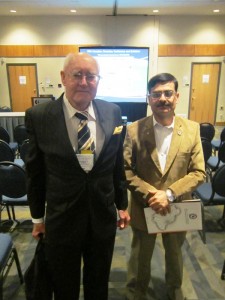Widgetized Section
Go to Admin » Appearance » Widgets » and move Gabfire Widget: Social into that MastheadOverlay zone
PMU Faculty Reveals Saudi Arabian Vegetable Consumption Complications in the 95th Canadian Chemistry Conference

Al-Khobar (KSA)/Calgary (Canada): A professor from the Department of Mathematics & Sciences in Prince Mohammad Bin Fahd University (PMU), Dr. Muhammad Waqar Ashraf participated in 2012 Canadian Chemistry Conference and Exhibition held from May 26-30, 2012 in Calgary, Alberta, Canada.
He represented Saudi Arabia in the conference where researchers from many countries participated. His research “Polycyclic Aromatic Hydrocarbons in Vegetables and Fruits produced in Saudi Arabia” attracted attention of conference attendees. “Causal relation between Saudi Arabian vegetables and their polycyclic aromatic hydrocarbons (PAH) contents must be understood thoroughly,” emphasized this researcher.
Large gathering of chemical scientists from all sub-disciplines discussed steps to energize chemistry in global context through debates to evaluate “Energizing Chemistry” theme.
Scientific programs, symposia and conference focused on the chemistry relevant to all facets of energy industry. Its symposium showcases best energy related researches and “energy futures.”
Research by Dr. Ashraf on vegetable consumption in Saudi Arabia analyzed eight important PAH congeners out of which most suspected carcinogens were discussed. PAH, as a group of fused aromatic ring compounds, form during incomplete combustion of fossil fuels and garbage. It contaminates foods and beverages. “PAH contents of root vegetables potato and carrot have higher values whereas turnip contains relatively lower contents in this country,” he said. The research defines peels more contaminated than cores in Saudi Arabian fruit vegetables.
The research explained deposition of airborne particles containing PAHs on exposed surfaces of leafy vegetables like spinach and cabbage and fruits in Saudi Arabia’s local produce. “Potentiality for agricultural production is limited in the country due to lack of arable land and renewable water resource,” he said.
Saudi Arabia, being biggest oil producer in the Gulf has extensive activities from refining to petrochemicals production throughout the year, so use of fossil fuels in all walks of life is common for PAH prevalence in environment.
This researcher explains chemical impact and related aspects including no viable efforts done yet to determine PAH levels in vegetables produced in agricultural farms of Saudi Arabia. “Country’s more than half cultivated area at 57% is in central Riyadh and Qasseem regions. Jizan, Asir, Al Baha and Najran in south combine at 19% cultivated land while Al Jouf, Tabouk and Hayel in the north are 13%. Eastern and western regions together account for 11% cultivated land,” says Dr. Ashraf.
The research on selected vegetable crops cultivated in various parts of Saudi Arabia included nine important vegetable varieties which account for about 90% vegetables consumption in the region. The results obtained were used to calculate a preliminary estimation of the contribution of these vegetables as source of PAHs exposure in Saudi population, said Dr. Ashraf further.
Dr. Warren E. Piers, Professor of Chemistry in the University of Calgary Chaired the Canadian Chemistry Conference and Exhibition in which this research by PMU got ample appreciation.

You must be logged in to post a comment Login